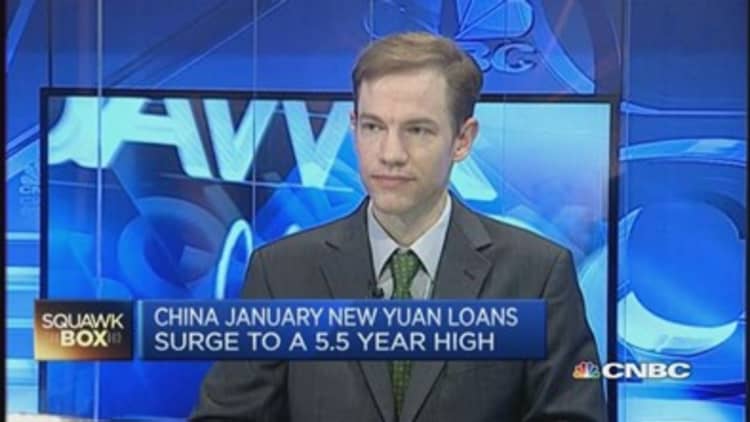Central banks may be trying to stem deflation by easing monetary policy and weakening their currencies, but the biggest threat is that China will wade into the battlefield, analysts say.
"The three trillion dollar question is whether the People's Bank of China (PBoC) will allow the yuan to depreciate and export their own disinflation to the rest of the world, setting off a series of competitive devaluations in the region," Nicholas Ferres, investment director at Eastspring Investment said in a note on Friday.
Twenty-four central banks have eased monetary policy this year amid slowing economic growth and deflationary pressure as oil prices hover near six-year lows. In February, the PBoC cut the one-year deposit rate by 25 basis points to 5.35 percent.
For now Chinese authorities continue to keep the yuan in a tight daily trading band against the U.S. dollar; the yuan has lost just 0.9 percent against the dollar year to date. By contrast, the dollar is up 3.3 percent again the Korean won and 4.2 percent against the Singapore dollar.
But the euro's around 12 percent decline against the greenback so far this year "will likely put more pressure on China to devalue the yuan… [which would] signal that China is joining the currency war," Bank of America Merrill Lynch (BoAML) FX and Rates strategist David Woo said in a note published on Monday.
"[This is] the biggest tail risk of 2015," he said.
Trading partners
Given that the currencies of two of its major trading partners – the euro zone and Japan – are much weaker, China may be tempted to follow suit, analysts warn.

The euro has dropped sharply since the European Central Bank (ECB) announced plans for quantitative easing (QE) in January, leading some analysts to speculate that the euro fall to parity against the dollar this year.
Meanwhile, the Japanese yen has weakened 11.4 percent against the greenback since the Bank of Japan expanded its QE program at the end of October.
"Growing Chinese deflation risk and further euro and yen depreciation could alter Beijing's calculations," BoAML's Woo warned in a note on February 3.
In January, China's inflation slowed to 0.8 percent on an annual basis, but rebounded slightly over the Chinese New Year holiday in February, to 1.4 percent.
Signs of weakness
While China set its 2015 growth target at "around 7 percent," sharply lower than last year's "around 7.5 percent" target, the country continues to run a healthy trade surplus.
But a collapse in import growth underlies the surplus – a sign the domestic economy may be very weak, analysts warn.
"On face value, the robust trade surplus diminishes the case for a depreciation of the Chinese yuan," said Eastspring Investment's Ferres. "However, if extremely weak domestic growth eventually leads to a rise in unemployment, my sense is that the People's Bank of China would allow the currency to depreciate."
That would have a domino effect, said BoAML's Woo.
"If everyone else is pushing their currencies weaker and you don't, you will end up with a strong currency that will come at the expense of your competitiveness," he said.
But, "in a world in which growth is scarce and there are not enough policy instruments to achieve higher growth, we suspect the currency war is here to stay," he added.
Editor's note: An earlier version of the story incorrectly said central banks are spreading deflation by easing monetary policy. It should be central banks stemming deflation by easy monetary policy.

